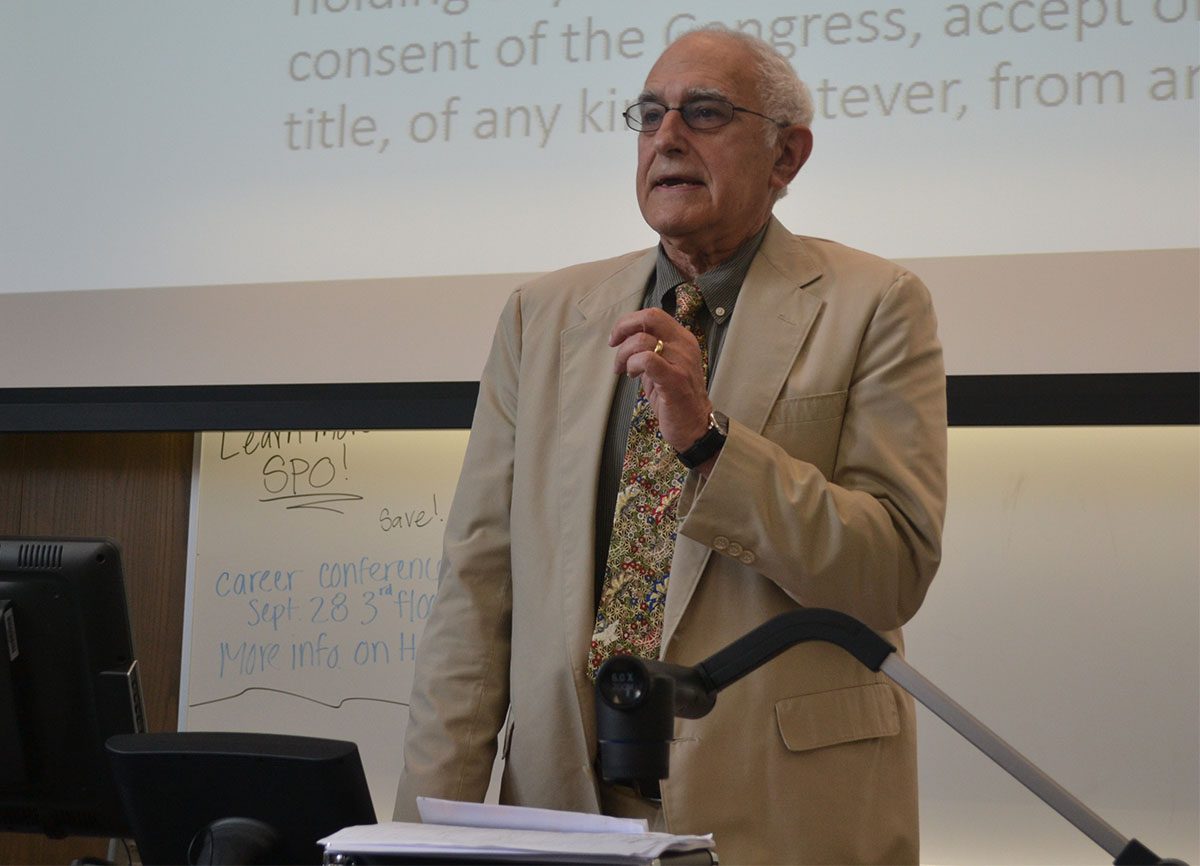Celebrating Constitution day at UW-Eau Claire
Professor Michael P. Zuckert from The University of Notre Dame discusses presidential war powers
More stories from Casey Ryan
Photo by Kar Wei Cheng
Michael Zuckert, a professor from the University of Notre Dame, gave a speech titled “Presidential War Powers and the Constitution” in celebration of Constitution Day.
In celebration of Constitution Day, Michael P. Zuckert, a professor from The University of Notre Dame, was invited to give his speech, entitled “Presidential War Powers and the Constitution,” at UW-Eau Claire.
“I am going to speak about one power today and one president,” Zuckert said. “I am going to talk about the power in question, which is the power to suspend habeas corpus.”
That one president was Abraham Lincoln. He focused on how Lincoln used the power to suspend habeas corpus during his presidency and the controversy that surrounded it.
Though Sept. 17 was the anniversary of the signing of the Constitution, Zuckert spoke a few days after, on Sept. 22.
Eric T. Kasper, the director of of the Center for Constitutional Studies, said Americans have debated the president’s war powers under the Constitution in the post-9/11 world “with special emphasis of constitutional civil liberties in wartime.”
The Constitution states in Article 1 Section 9: “The Privilege of The Writ of Habeas Corpus shall not be suspended, unless when in cases of Rebellion or Invasion the public Safety may require it.”
Habeas corpus is a writ requiring a person under arrest to appear before a judge or court, especially to secure the person’s release unless they are lawfully detained, according to Zuckert.
“Even if the president does not have the explicit power to suspend habeas corpus, it is an implied power under some circumstances, and it would be his duty to execute faithfully,” Zuckert said.
Lincoln suspended the writ of habeas corpus during the Civil War for a state legislator from Maryland, who was caught hindering the movement of Union troops.
When Lincoln did this, the general in command refused to turn over the state legislator who had hindered the movement of troops. A federal judge ruled Lincoln did not have the right to suspend habeas corpus.
Lincoln did not defy the ruling until he spoke on July 4, when he insisted he need the ruling overturned in order to defeat the South.
Because the Constitution does not explicitly give the power to suspend the writ of habeas corpus, it became a topic of debate.
“Lincoln used his power as president and was overruled,” Zuckert said.
In closing, Professor Zuckert stated what happens when habeas corpus is suspended:
“When the privilege of the writ is suspended, the prisoner is denied the right to secure such a writ, therefore can be held for trial indefinitely.”
Many students filled the lecture hall to hear Zuckert’s speech.
“I decided to come because I want to be updated on what is going on in the world,” Kiara Escaffi, a biology student, said.
Breah Ostertag, a first-year criminal justice student, and her friend Sara Anderson, a first-year student studying public history, were excited a professor from Notre Dame was at Eau Claire.
“I’m here for fun; I’m not doing anything on a Friday afternoon, and it’s a fun thing to see this happen on campus — a professor from such a prestigious school,” Anderson said.
“I think it’s really neat that a professor from Notre Dame is here celebrating constitution week,” Ostertag said.

